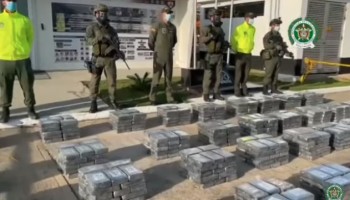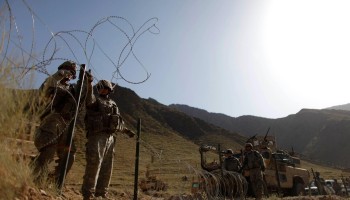In recent years, their names have been appearing on arrest warrants and indictments. An intricate undercover US Drug Enforcement Agency (DEA) operation that convinced Viktor Bout he was selling weapons to a Colombian group led to Bout’s arrest in Thailand last year. An earlier DEA operation using the same premise – that the buyer of arms was the Colombian FARC – led to the arrest of Al-Kassar in Spain in 2007. This year, an undercover Immigration and Customs Enforcement (ICE) agent convinced Monsieur, a Belgian, that he was making deals to sell American jet engines to Iran, in violation of a US embargo. Monsieur was arrested in August upon his arrival in New York.
These international scofflaws have enjoyed impunity for years. But sources said that after the terror attacks of Sept. 11, 2001, agencies and countries began realizing that sanctions-busters are a problem not just for countries at war, but a problem for everyone. The DEA, ICE and other agencies also realize that transnational terrorism, arms dealing and drug trafficking are not separate, odious crimes, but that feed off each other. Law enforcement agencies are also sharing more and better information than they did when men like Viktor Bout helped fuel multiple African conflicts in the 1990s. Whether or not the names of Bout, Monsieur and others like them will end up on guilty verdicts and not just on indictments,remains up to the courts.
A Different DEA
In the popular imagination, DEA agents’ focus is on the Mexican and South American cartels that funnel marijuana and cocaine to the US. But the agency’s global reach – which the DEA has been building for more than 40 years – means the agency has a lot of hard intel on people who may not make their living from drugs.
“When I got into this 30 years ago, a dope dealer was a dope dealer,” said James Soiles, assistant special agent in charge of the DEA’s Special Operations Division. “The world is so connected now, a commodity is a commodity and [shady businessmen] don’t care what commodities they move, or whether some of them happen to be illegal.”
Al-Kassar, for example, had shown up in more than 75 DEA investigations over 20 years. His lengthy rap sheet includes a 1984 expulsion from Britain for arms and drug dealing and a $150,000 fine levied by Germany for holding illegal passports. The US’s Iran/Contra report in 1987 said Al-Kassar sold weapons to the “enterprise” that armed the Contras. Spain arrested him in 1992 and charged him with providing weapons to Palestinian terrorists who hijacked the Achille Lauro cruise ship in 1985. But he was released on $15.5 million bail the next year, and was acquitted in 1995. Al-Kassar reportedly brokered a deal that sold Polish weapons to Croatia and Bosnia while the former Yugoslavia was under embargo. He was implicated in shipping arms to embargoed Somalia, and was thought to have armed insurgents in Iraq.
“We used what we had in our files to target his organization in the hope that we’d make a drug case against him,” Soiles said. But using undercover agents, the DEA instead made the case that Al-Kassar and an associate tried to sell more than 12,000 weapons and two million rounds of ammunition to the FARC – with the understanding that the weaponry would be used against US helicopters in Colombia. A federal court found Al-Kassar guilty of various conspiracies and money laundering last year. In February he was sentenced to 30 years.
The DEA’s case against Bout was similar. The agency had known about him for years. With the support of its senior officials, the DEA decided to go after him however they could, attacking his organization’s soft spots. It wasn’t a cakewalk. Between the decision to bring Bout down and the day the Thai police cuffed him in a Bangkok hotel, seven months passed.
Int’l Relationships the Key
The international relationships built in the many years the agency has worked outside the US is the key to the DEA’s success. “We don’t work unilaterally,” Soiles said. Spain and Romania were instrumental in the al-Kassar case; Thailand was the same for the Bout arrest. Soiles also pointed out that the US has some sharp, useful tools to use in these transnational cases. US extraterritorial law stipulates that if Viktor Bout tried to sell 700 surface-to-air missiles to the FARC, which the US has designated a terrorist organization, Bout could be prosecuted in an American court. The US’s racketeering laws and asset forfeiture statutes also mean that US authorities have an easier time prosecuting conspiracies and confiscating the profits than do the authorities in other countries.
The DEA is getting more involved in arresting arms dealers for two reasons, said Doug Farah, a co-author of the 2007 book “Merchant of Death,” which detailed Viktor Bout’s business dealings worldwide. “One is that they are the only agency that has really kept its ability to carry out good human intelligence and run informants. Most agencies lost that. Both the Al-Kassar and Bout operations were built on informants penetrating the inner circle,” Farah said. “The second is the overlap now between criminal drug gangs and terrorism, particularly in the cases of the FARC in Colombia, Taliban in Afghanistan/Pakistan et cetera. While not tasked on terrorism issues, the DEA has the lead in drug cases, so they move fairly aggressively in this.”
Few recent cases illustrate the drugs, arms and terrorism links better than the DEA’s case against a former Syrian military man named Jamal Yousef. Yousef had proposed to hand over hundreds of rifles, several thousand grenades and other deadly equipment to the FARC, in exchange for more than a ton of cocaine. Unfortunately for him, the contacts he thought were FARC rebels turned out to be DEA informants. Yousef pleaded not guilty to narco-terrorism conspiracy in August and is being held without bail while he awaits trial.
ICE, meanwhile, has a counter-proliferation investigations unit that works to prevent terrorist groups and countries hostile to the US from getting their hands on US weaponry and technology. Working on the same cases as the DEA, it has had similar success. In fiscal 2007 alone, counter-proliferation agents arrested 186 people and got 115 convictions. In one case, undercover agents arrested a Sri Lankan man and five of his associates in Guam after the group had negotiated weapons and ammunition deals for the Tamil Tigers, which the US has designated a terrorist group. All pleaded guilty. Others have gone to jail for trying to export sensitive technology, like night-vision goggles, radars and missile components. Still others, including Jacques Monsieur, have faced jail time for trying to sell US equipment to countries under embargo. In Monsieur’s case, he was accused of using a front company in Kazakhstan and planning to ship jet engine parts via Colombia to Iran.
“It’s grown into a more international effort over time,” said counter-proliferation acting unit chief Scott Flavens. “I think the world is getting smaller and closer together, and what’s dangerous to us is dangerous to [other countries] also.”
Now up to the Courts
The arrests are only the beginning. The courts are not only going to decide whether the defendant is guilty – they will also create precedents for these types of cross-border crimes.
Observers of the illicit arms trade cheered when Monzer Al-Kassar received his 30-year sentence in February. Jacques Monsieur is in the dock in the US state of Alabama – he and his associates allegedly wired money to a bank in an Alabama city – and he pleaded guilty Nov. 24 to conspiracy to illegally export F-5 fighter jet engines and parts from the US to Iran. He faces up to five years in prison.
Viktor Bout, however, has not moved from the Thai prison in which he’s been sitting since March 2008. Doug Farah, the Bout expert, said that though the Thai authorities were 100 percent part of the arrest, and that the arrest was legal there, Bout’s connections in Russia have trumped justice for the moment. In August, a Thai court was supposed to decide whether the US’s extradition treaty was valid, a bit of legalese before arranging to send Bout to the US for trial. But the judge ruled instead that the FARC is a political movement rather than a terrorist organization, and rejected the extradition request. There have been other reported judicial shenanigans, such as appellate judges secretly meeting with Bout and his lawyer. “The Russians …stepped in with large amounts of money and penetrated the judicial system,” Farah said.
Watching for convictions is what one arms-trade watcher said she’ll be doing in the coming months. “I wouldn’t want to sell the arrests short, because the arrests of arms dealers are worth popping a bottle of Champagne for; it’s just a bigger bottle if they get convicted,” said Andie Lambe, who heads London-based watchdog Global Witness’s campaign to end impunity for traffickers in arms, timber and diamonds.
One notorious case – that of Ukrainian-born arms dealer Leonid Minin – may give Lambe reason for skepticism. In the late summer of 2000, police in a Milan suburb got a tip that they should look into a cocaine party in progress at a local hotel. When the police arrived, they found Minin in the hotel room with four prostitutes, 58 grams of cocaine, $150,000 in cash, half a million dollars in diamonds, and thousands of documents pertaining to his businesses in timber, oil, diamonds and guns. “It’s the smoking gun dream that most police and prosecutors have,” Lambe said. But Minin walked. He was neither an Italian citizen, nor did any arms trafficking take place in Italy, so he couldn’t be convicted of arms trafficking under that country’s laws.
Political Will Developing
Minin’s case then, and Viktor Bout’s case today, can sour activists like Lambe. But she also pointed out that recent years have seen indictments over complicated alleged transnational crimes that 10 years ago would never have been attempted. Former Liberian president Charles Taylor is facing a war crimes trial in The Hague. In October, a French court sentenced two businessmen to six years in prison for shipping nearly $800 million in weapons to Angola in the 1990s. And earlier this month, Britain sentenced one of its millionaire businessmen to nearly three years in jail for selling amphibious vehicles to Sudan.
“There’s political will developing. If jurisdictions know that other jurisdictions are trying, then it gives them a boost,” Lambe said. “There appears to be greater international cooperation on a lot of different issues, not just arms trafficking. It’s a chicken and egg situation – greater cooperation equals greater cooperation, which equals successes which equals greater cooperation. I feel like generally there’s a greater cooperation than before, though there is still a long way to go.”
James Soiles, the DEA agent, thinks everyone can do better. “Guys like Bout and Kassar, they’re the fuel – without the weapons you don’t have the mayhem,” he said. “We have to do better at closing the gaps. By ‘we,’ I’m not saying DEA or the US government, I’m talking globally – all of our countries have to do better.”
--Beth Kampschror





